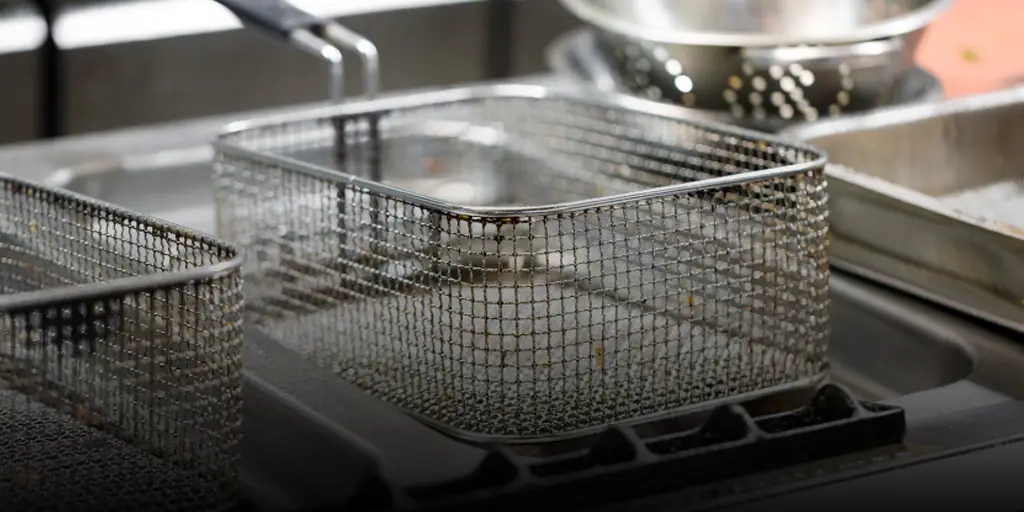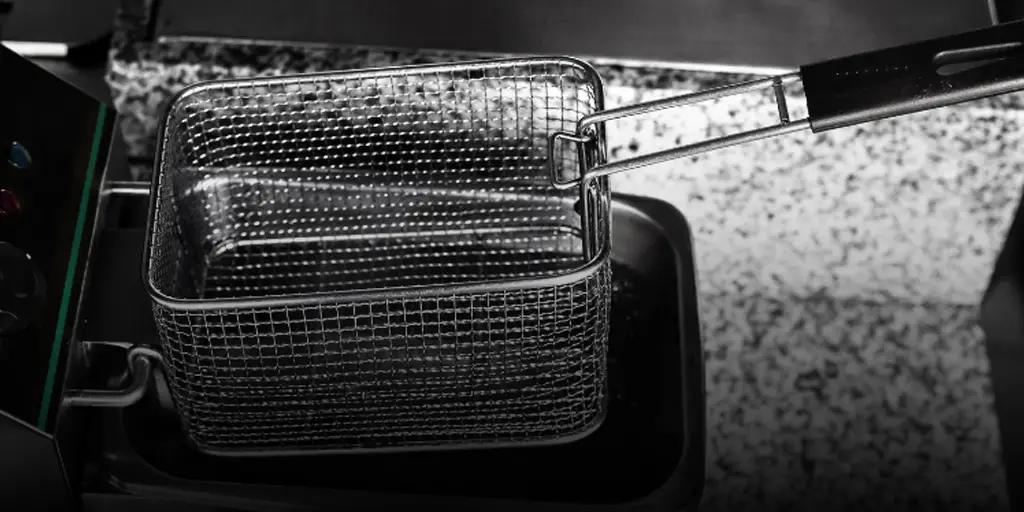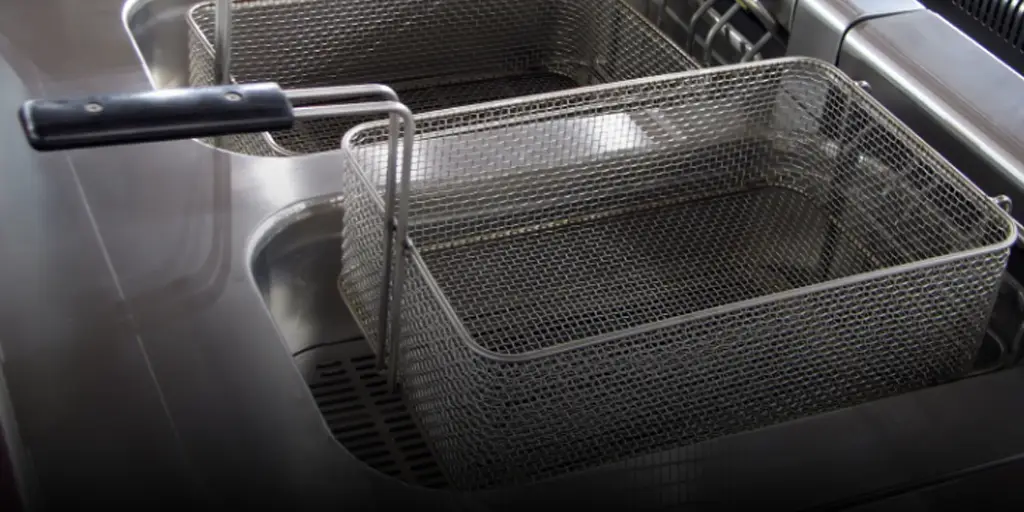Deep frying has, over the decades, established itself as a culinary favorite. It’s not just about the golden, crispy exteriors or the delectable, juicy interiors it gives to our foods.
Deep frying introduces a texture and flavor profile that’s virtually impossible to replicate with other cooking techniques.

This unique appeal explains why restaurant foods, especially those sinfully delicious fries or chicken wings, have an irresistible charm.
However, achieving similar culinary feats at home requires not just the skill but also the right equipment. Enter the electric or stovetop deep fryer, the unsung hero behind many of our beloved fried treats.
But, like all heroes, deep fryers need care too.
The Importance of Regular Cleaning
Every culinary enthusiast knows that the secret to delicious food isn’t just about the ingredients or the technique – it’s also about the tools and their maintenance.
The deep fryer is no exception. Regular cleaning isn’t just a matter of hygiene; it directly impacts the taste and quality of the food.
Rancid oil is a culprit behind many a ruined dish, and it can develop from leftover food particles or oil that’s been reheated too many times.
Additionally, accumulated grease and food debris can lead to appliance malfunctions or even become a fire hazard.
Moreover, regular cleaning prolongs the lifespan of your deep fryer. Think of it as a spa day for your fryer; it works hard, and it deserves a bit of pampering.
Plus, a well-maintained fryer is more energy-efficient and ensures consistent cooking results every time.
The Best Way to Clean a Deep Fryer

Supplies Needed:
Before diving into the cleaning process, it’s crucial to gather all the necessary supplies. Being prepared can make the task quicker and more efficient. Here’s what you’ll need:
- Dish Soap: A mild dish soap works wonders in breaking down grease.
- Water: Warm water can help in loosening grime.
- Soft Cloth or Sponge: For gentle scrubbing.
- Vinegar: Acts as a natural cleaner and deodorizer.
- Baking Soda: Helpful in tackling stubborn stains.
- Old Toothbrush: Perfect for reaching tight nooks and crannies.
- Paper Towels: For drying and wiping down.
Step-by-Step Guide:
- Unplug and Cool Down: Safety first! Always ensure the fryer is unplugged and has cooled down entirely before cleaning.
- Remove Oil: Pour out the used oil into a container. If it’s still in good condition, you can strain and reuse it.
- Wipe Down: Using paper towels, wipe away any loose debris or excess oil from the fryer’s interior.
- Prepare Cleaning Solution: Mix dish soap with warm water. For stubborn stains, create a paste using baking soda and a little water.
- Scrub: Gently scrub the interior of the fryer with the soft cloth or sponge dipped in the cleaning solution. Use the old toothbrush for hard-to-reach areas.
- Rinse: Rinse off the soap thoroughly with warm water.
- Deodorize: If there’s a lingering odor, wipe the fryer’s interior with a cloth dipped in vinegar.
- Dry: Thoroughly dry the fryer using paper towels. Ensure no moisture remains as this can degrade the oil faster in your next frying session.
How Often Should You Clean?
The frequency of cleaning your deep fryer largely depends on its usage. Here’s a general guideline:
- Occasional Use: If you’re someone who uses the deep fryer just for those special weekend treats, it’s advisable to clean it after every use. This ensures it’s ready and safe for your next frying session.
- Frequent Use: For those who can’t resist fried foods and use the fryer almost daily, a thorough wipe-down after each use is recommended. However, a more in-depth cleaning should be performed at least once a week. This balances maintenance with the convenience of use.
- Commercial Use: In a bustling commercial setting, light cleaning should be done daily due to the high volume of frying. A more rigorous deep-clean should be scheduled twice a week to ensure both safety and food quality.
Remember, irrespective of the frequency, always be on the lookout for signs of rancid oil, such as a foul odor or a change in the oil’s viscosity.
Benefits of a Clean Deep Fryer

Understanding the benefits of a clean deep fryer can serve as a motivating factor to maintain it regularly. Here are some compelling reasons:
- Improved Taste: Clean oil and a grease-free fryer ensure that your food tastes as it should – fresh and delicious.
- Health Benefits: Consuming food fried in degraded oil can be harmful. Regular cleaning reduces the risk of ingesting harmful substances.
- Extended Fryer Lifespan: Just like any other appliance, proper maintenance can extend the life of your deep fryer, giving you more value for your money.
- Energy Efficiency: A clean fryer heats up faster and maintains its temperature more consistently, saving you both time and energy.
- Safety: Accumulated grease can be a fire hazard. Regular cleaning ensures you and your kitchen remain safe.
Warnings and Precautions
While deep fryers are incredible appliances, they come with their set of risks if not maintained properly:
- Fire Hazard: Leftover food particles can get overheated and ignite, posing a fire risk.
- Health Concerns: Rancid oil or oil that’s been overheated can produce harmful compounds. Consuming foods fried in such oil can lead to health issues over time.
- Inconsistent Cooking: A dirty fryer might not heat up uniformly, leading to unevenly cooked food.
“A stitch in time saves nine. Regular maintenance can prevent potential disasters in the kitchen.” – Anonymous Culinary Expert
Expert Tips for Deep Frying at Home
Deep frying might seem straightforward, but to achieve that perfect crunch and flavor every time, it’s worth considering some expert recommendations:
- Right Temperature: Ensure the oil is at the right temperature before adding food. Typically, 350°F to 375°F (175°C to 190°C) is ideal for most foods. Use a kitchen thermometer for accuracy.
- Don’t Overcrowd: Adding too much food at once can drop the oil’s temperature, leading to soggy and oily results. Fry in batches for the best outcome.
- Use the Right Oil: Not all oils are created equal. Choose oils with a high smoke point like canola, peanut, or vegetable oil for deep frying.
- Dry Your Food: Before frying, ensure that the food is dry. Excess moisture can cause the oil to splatter, which can be dangerous.
- Safety First: Always have a fire extinguisher on hand when deep frying. In case of minor oil fires, turn off the heat and cover the pan with a metal lid.
“Deep frying is an art. Like all art forms, it requires a blend of skill, the right tools, and passion.” – Chef Julianne Keaton
Further Reading Recommendations: Best Oils for Frying Chicken & Wings
FAQ: Deep Fryer Cleaning Queries Answered
Frying enthusiasts often have questions about the maintenance of their beloved deep fryers. Here are some frequently asked questions and their answers:
- How often should I replace the oil in a deep fryer?
It depends on the type of food you’re frying and the oil’s quality. However, a general rule of thumb is to change the oil after every 8-10 uses. - Can I use dish soap to clean my deep fryer?
Yes, a mild dish soap is effective in breaking down grease. Just ensure you rinse thoroughly to avoid any soapy residue. - What are signs that my deep fryer needs cleaning?
A lingering foul odor, change in oil viscosity, or the presence of excessive food debris at the bottom are clear indicators.
Conclusion
In the culinary world, the deep fryer is a powerhouse, transforming simple ingredients into crispy, flavorful delights. Yet, like any tool, its efficiency and effectiveness lie in its maintenance.
Understanding how to clean a deep fryer isn’t just about prolonging its lifespan; it’s about ensuring every dish you prepare meets the high standards of taste and health.
Taking regular care of your fryer might seem tedious, but as we’ve outlined, the process is straightforward.
With the right supplies and a bit of time, you can ensure your fryer is in top condition, ready to assist you in creating mouth-watering dishes.
Remember, the joy of cooking isn’t just in the end product but also in the process. Keeping your tools, especially your deep fryer, in pristine condition is a testament to your commitment to the art and science of cooking.



